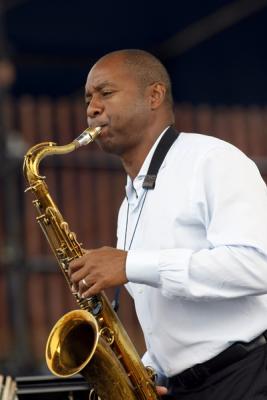 Coltrane’s A Love Supreme: Live in Amsterdam reissue from the Branford Marsalis Quartet out now and available on vinyl for the very first time Read more »
Coltrane’s A Love Supreme: Live in Amsterdam reissue from the Branford Marsalis Quartet out now and available on vinyl for the very first time Read more »
Review: Branford Marsalis Quartet: tour-de-force blend of order and mayhem
It was surreal, as if they had stepped into an adjoining room. Were they sharing a private joke? Showing off? Or maybe their brains are just linked after 13 years of sharing the bandstand.
A few observations: Marsalis has a massive sound; he doesn’t need to get anywhere close to a microphone to be heard. Also, he makes the saxophone sound like a woodwind; there’s this rich woodsy-ness to his tone. His delivery is urgent and beautiful. Ditto for bassist Eric Revis. Every note that he plays is a gem — fat tone, perfect pulse, like Jimmy Garrison. He never overplays; he seems to arrive at each note inevitably, as if it is the result of long, silent consideration.
The level of listening within the group is obvious, and it has developed a strategy of presentation. About half the time, it plays “burnout” tunes, which merge Coltrane with the ultra-aggressive levels of virtuosity now universal in jazz; Marsalis tends to play these on tenor. The other tunes are more reflective, ballad-like, and often out of a 1970s Keith Jarrett bag, with lots of rubato or free tempo. Cymbals quietly splash as Calderazzo rhapsodizes and Marsalis plays prettily, at times floridly, on soprano saxophone, a difficult instrument that he controls as well as anyone.
Those ballad reflections, mostly composed by Calderazzo, can get treacly. I’ll take the burnouts: Toward the end of the set, the group played Monk’s “52nd Street Theme” as you’ve never heard it — as if Charlie Parker had survived into the mid-’60s and embraced the new revolution.
Calderazzo’s solo was like automatic writing, an upsurge, tumbling and spilling, coalescing into bebop lines, then growing into something else — something dense, percussive; the piano as drum. Throughout the night, he and Faulkner challenged one another percussively, wave against wave, with Revis as fulcrum, the balancing element. When it was time for his solo, Marsalis sucked up the band’s rocket fuel and propelled up out of the storm.
But enough is enough, right? The first set’s encore was Ellington’s “Mood Indigo,” played gorgeously by Marsalis, with old-fashioned vibrato, bluesily spinning new melodies throughout his solo, nice and relaxed.
The second show started with “Steepy in Faith,” by the late pianist Kenny Kirkland, who preceded Calderazzo in this group. It’s a tricky tune; the band made it sound so clear, like follow the dots. The melody, the clean tempos, the dynamics of the performance, including dramatic crescendos: everything was in sync, clearly articulated. It’s easy to overlook the care that goes into the group’s presentation; Marsalis must have learned this during his time with Art Blakey, 30 years ago.
Two more highlights.
No. 1: A burnout number found the rhythm section cycling tempos inside tempos in cryptic ways, building excruciating tension; the audience started shouting at the band, cheering. Then with his three band mates throwing a 5/4 riff at him, Faulkner unleashed a solo so powerful — well, you don’t want to put too much pressure on the kid. He’s only 20, he’s still learning, and yet — I’ve heard a lot of drum solos, and this was something else. It was definitely not “Take Five.”
Later, Marsalis played Gershwin’s “(Our) Love Is Here to Stay.” His solo was concise, packed with soul, something like Lockjaw Davis. Branford, you’re something else, too. What a night.
Categories
Tags in Tags
Branford Marsalis Branford Marsalis Quartet ellis marsalis four mfs playin' tunes Joey Calderazzo Justin Faulkner Marsalis Family marsalis music metamorphosen miguel zenon music redeems new orleansFilter by Artist
Marsalis Music Radio
Join Our Mailing List
- RT @bmarsalis: Compliments of the @T_Blanchard archives. https://t.co/4RsXbyEloa — 3 years 19 weeks ago MarsalisMusic
